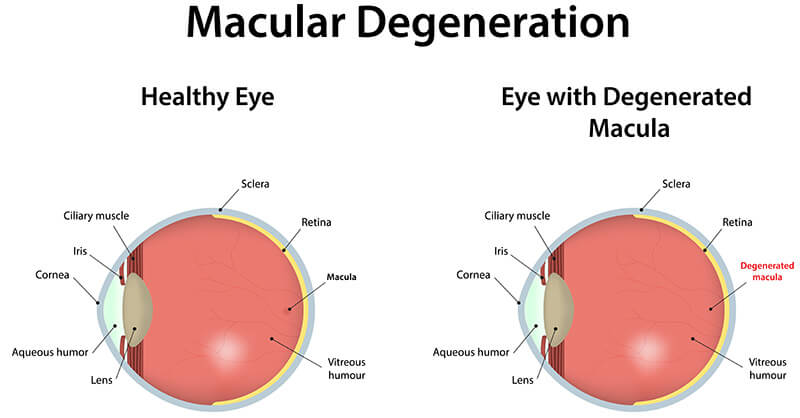What is Macular Degeneration?
Macular degeneration is an eye condition that affects the tissue located at the back of the eye, known as the retina. This tissue is sensitive to light and transmits signals to the brain so you can see.
The proper functioning of the retina is essential for crisp and clear quality vision. The macula is a location on the retina that is responsible for your central vision.
Whenever you look at something directly, the macula allows you to see that image in detail. In macular degeneration, the cells responsible for central vision in the macula become damaged.
There are two types of macular degeneration: dry and wet. Dry macular degeneration often progresses gradually.
There are also different stages of dry macular degeneration. Once dry macular degeneration moves from the early stage and reaches the intermediate stage, symptoms will become more apparent.
If the condition progresses and passes the late stage, it may worsen and transition into wet macular degeneration. Wet macular degeneration is the more severe type and can cause serious central vision changes that require treatment.
Although wet macular degeneration is less common, it can cause vision damage much quicker than dry macular degeneration.

What Causes Macular Degeneration and Who is At Risk For Developing it?
Macular degeneration is often also called age-related macular degeneration. This is because most people who develop macular degeneration develop the disease due to age.
As you age, your macula will begin to thin over time. Due to this, age is the factor that causes you to be at the highest risk for developing macular degeneration.
Macular degeneration is characterized by the growth of abnormal blood vessels in the retina. When these blood vessels swell and leak, there will be damage caused to the macula.
Wet macular degeneration is characterized by the growth of abnormal blood vessels in the retina. When these blood vessels swell and leak, there will be damage caused to the macula.
Experts do not know the exact cause of the development of abnormal blood vessels. However, there is evidence that smoking and having a family history of the condition may make you at higher risk for developing it.
What Are the Symptoms of Macular Degeneration?
Early macular degeneration typically does not cause many symptoms. Although, if the condition progresses to the late stages or transitions to wet macular degeneration, symptoms will be more apparent.
The symptoms of macular degeneration often vary from person to person. However, some of the most common symptoms of the condition are:
- Straight lines appear crooked, wavy, or distorted
- Difficulty seeing in low-lighting
- Blurry, missing, or distorted central vision
- Colors appear dull or diluted
If you notice any of these symptoms, especially changes in central vision or if straight lines appear wavy, visit your eye doctor right away.

How Do Eye Doctors Treat Macular Degeneration?
There is no treatment available for macular degeneration when it is in the dry stage. If you have dry macular degeneration, your eye doctor will continue to monitor your eyes for changes in the condition.
Your eye doctor will likely want to see you regularly to ensure that the condition is not worsening or progressing to wet macular degeneration. They may also recommend that you begin taking special vitamins that can prevent or slow the condition’s progression.
Wet macular degeneration, although more severe, is treatable. Our eye doctor at Jackson Eye Care performs Anti-VEGF injections to treat wet macular degeneration.
These injections aim to prevent vision loss by preventing new growth of abnormal blood vessels and current abnormal blood vessels from leaking. Do you want to learn more about how eye doctors can help preserve vision in those who have macular degeneration? Schedule an appointment at Jackson Eye Care in Livingston, NJ, today!
